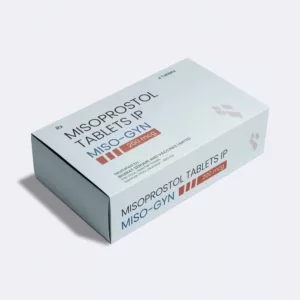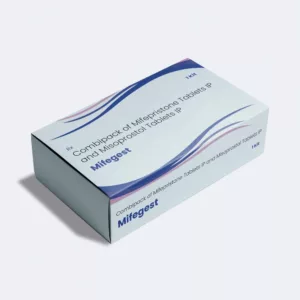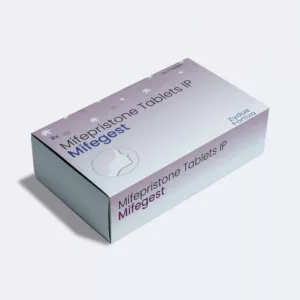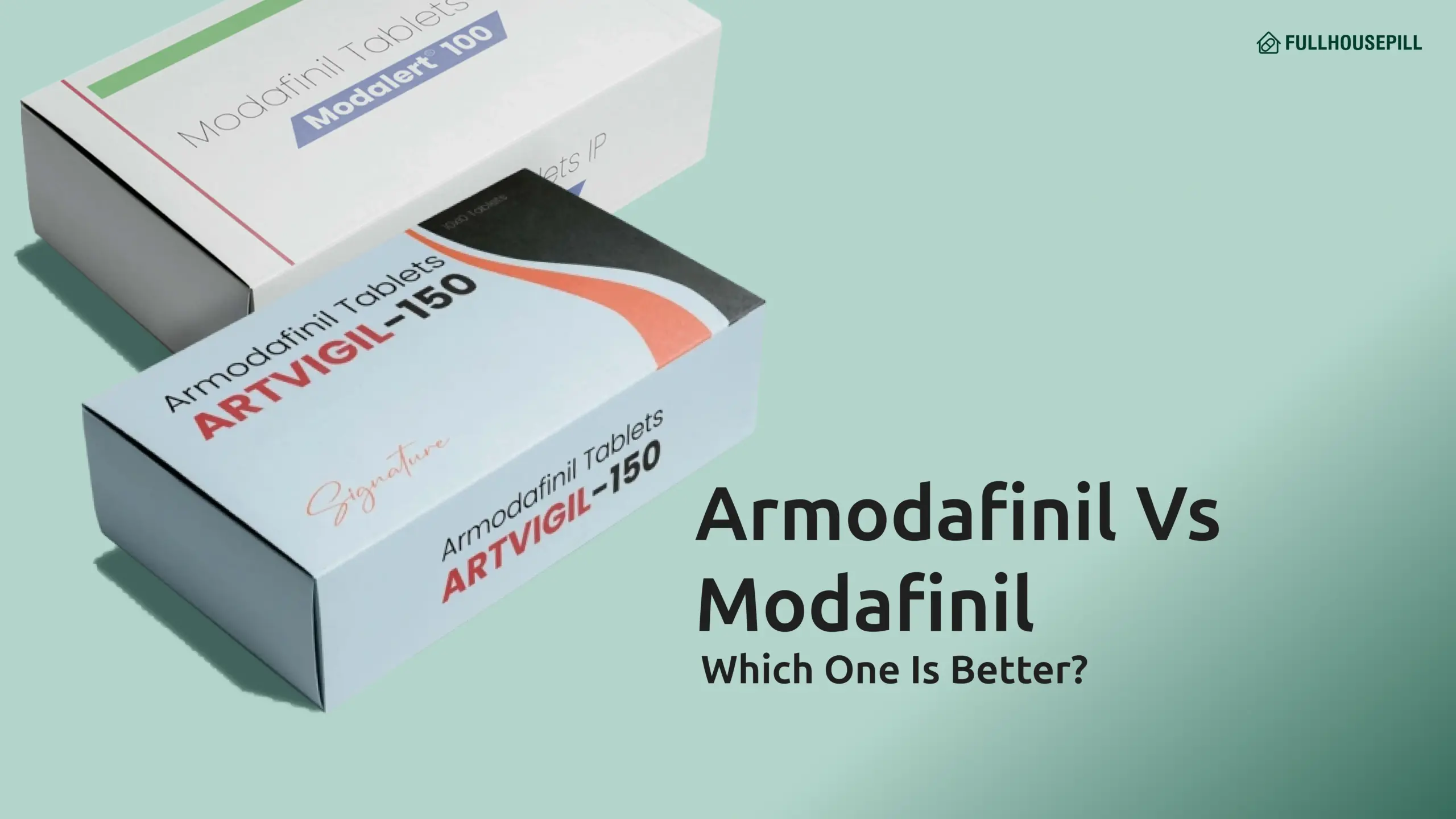Abortion
Medication abortion is a trusted, non-surgical way to end an early pregnancy, typically within the first 10 weeks. It’s safe, private, and widely used by people who want to manage the process in their own space, on their own terms. No hospital stays, no anaesthesia, no invasive procedures. The process involves two pills: mifepristone, which stops the pregnancy from progressing, and misoprostol, which helps your body pass it. Taken correctly, the combo is over 95% effective and feels more like a natural miscarriage than a clinical procedure. It’s the go-to option for millions who want a safe, discreet alternative to in-clinic abortion.
Whether you’re facing an unplanned pregnancy or simply want to handle things privately, medication abortion puts the control back in your hands. It’s also a smart option in places where surgical access is limited or delayed. We offer clinically approved abortion pills with clear instructions and discreet delivery. Every product is sourced from verified pharmaceutical manufacturers. If you’re looking for a private, safe, and proven way to end an early pregnancy, you’re in the right place. You don’t have to wait, worry, or settle for uncertainty. Take charge today with medication that works.
Safe and Affordable
Discreet Packaging
Trustpilot Verified
Hassle Free Delivery
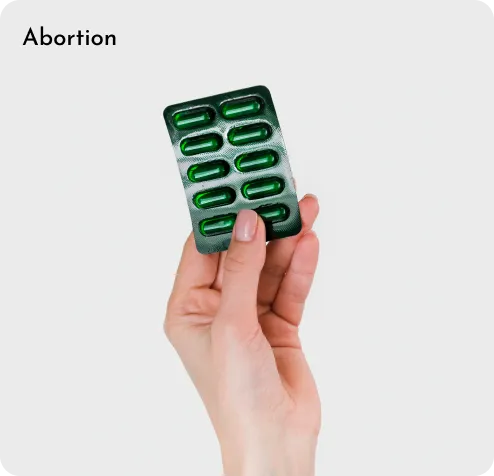
Filter by categories
A medication abortion is a non-surgical method used to end an early pregnancy. This process involves taking abortion pills rather than undergoing a clinical procedure. Most people refer to this method as the abortion pill, although it typically involves two different medications. A medical abortion is approved for pregnancies up to 10 weeks gestation. This option is commonly chosen due to its privacy and convenience. Abortion with pills is also preferred by many because it feels more natural and less invasive than surgical procedures. Mifepristone and misoprostol are the primary medications used in most medical abortions. Some individuals, however, only use misoprostol, although this method is generally less effective. Medical abortion is increasingly popular among women managing unplanned pregnancies, especially in countries where access to surgical options is limited.
How does the abortion pill work?
The abortion pill works by using two different medications, mifepristone and misoprostol, which interrupt the pregnancy in two stages. This method is commonly referred to as a medication abortion, and it is approved for use during the first 10 weeks of gestation. Both pills have distinct but complementary roles in ending the pregnancy safely and effectively.
Mifepristone is the first medication taken during the process. This pill blocks the hormone progesterone, which is essential for maintaining a pregnancy. Progesterone helps thicken the uterine lining and supports the embryo’s growth. Mifepristone binds to progesterone receptors and effectively stops the hormone from doing its job. Without progesterone, the uterine lining begins to break down, and the pregnancy can no longer continue.
Misoprostol is the second medication, taken 24 to 48 hours after mifepristone. This drug causes the uterus to contract and expel the pregnancy. These contractions mimic a natural miscarriage and lead to cramping, bleeding, and the passage of pregnancy tissue. Misoprostol can be taken orally, sublingually (under the tongue), buccally (in the cheek), or vaginally, depending on medical advice and personal circumstances.
The combination of mifepristone and misoprostol is what makes the abortion pill highly effective. Mifepristone softens the cervix and destabilises the pregnancy, while misoprostol triggers the physical process of expulsion. Together, they work in sequence to safely terminate the pregnancy without surgery.
The onset of action usually begins within a few hours after taking misoprostol. Most people experience bleeding and cramping within 4 to 6 hours. The heaviest bleeding typically occurs during this period and may last for several hours. The process may feel intense but is usually manageable with pain relief and rest.
The duration and intensity of symptoms may vary depending on how far along the pregnancy is. Earlier pregnancies generally involve lighter symptoms, while later first-trimester abortions may involve stronger cramping and more bleeding. Regardless of timing, the body responds to the medications in a predictable sequence.
A follow-up exam or ultrasound is typically scheduled one to two weeks later. This step confirms that the abortion is complete and checks for any remaining tissue or complications. Incomplete abortion is rare when the pills are taken correctly under guidance, but confirmation is essential to ensure health and safety.
The mechanism of action of the abortion pill is well-researched and supported by global medical organisations. Mifepristone initiates the process by blocking essential hormones, and misoprostol completes it by triggering uterine contractions. Together, these medications provide a non-surgical option for early pregnancy termination that is safe, effective, and increasingly accessible.
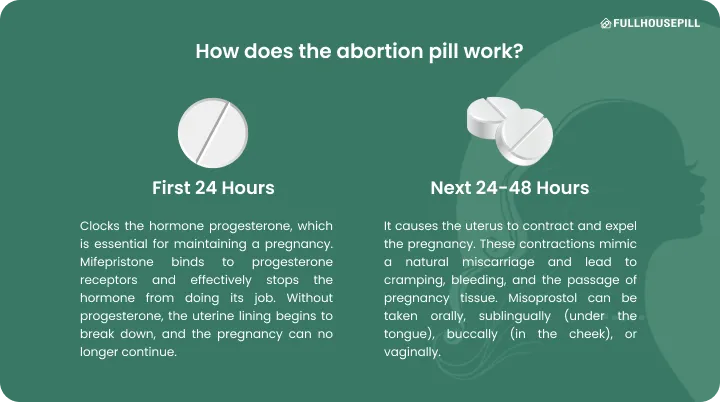
How to use the abortion pill?
The abortion pill is taken in two stages. Mifepristone is usually taken first under medical supervision. A common dose is 200 mg taken orally at the clinic. Misoprostol follows 24 to 48 hours later. Most people take 800 micrograms of misoprostol at home. The tablets are placed under the tongue for 20 minutes. Any undissolved particles are then swallowed. This sublingual method allows for faster absorption. After taking misoprostol, cramping and bleeding usually begin within a few hours. A follow-up call from a healthcare provider is common around 24 hours later. Patients are asked about pain levels, bleeding, and side effects. A follow-up ultrasound is typically scheduled about two weeks later to confirm the pregnancy has ended. This timeline may vary depending on healthcare provider guidelines or regional protocols.
What are the side effects of the Abortion pill?
The abortion pill produces several side effects as it works to end a pregnancy. Most side effects are temporary and manageable, though a few may indicate serious complications and require medical attention.
Common Side Effects of the Abortion Pill
- Cramping
Cramping is the most common side effect. Misoprostol stimulates powerful uterine contractions, which often result in moderate to intense cramping. This pain usually begins within a few hours after taking misoprostol and may last for several hours. - Vaginal Bleeding
Bleeding is expected and usually heavier than a typical period. Blood clots and visible tissue may be passed. Bleeding often starts after misoprostol is taken and can last several days to a few weeks. Sanitary pads are recommended during this time to monitor bleeding volume and prevent infection. - Gastrointestinal Symptoms
Nausea, vomiting, and diarrhoea are frequently reported. These symptoms may occur within hours of taking the abortion pill and typically resolve on their own. Over-the-counter medications can help manage discomfort if needed. - Fever and Chills
Fever or chills can occur, especially within the first 24 hours of taking misoprostol. A mild fever is common and may subside without treatment. However, a high or persistent fever may indicate infection. - Dizziness and Fatigue
Dizziness and tiredness are often caused by blood loss, hormonal changes, or dehydration during the process. Rest, fluids, and light meals can help reduce these symptoms. - Headache
Headaches may result from hormonal fluctuations, dehydration, or the physical stress of cramping. These usually pass within a day or two.
Severe Side Effects That Require Medical Attention
- Heavy Bleeding
Excessive bleeding should never be ignored. Soaking more than two large pads per hour for two consecutive hours can signal a serious problem. A clinical study reported that 78% of patients experienced excessive bleeding after taking the abortion pill. - Abdominal Pain with Bleeding
Around 5% of participants in the same study experienced both abdominal pain and bleeding. An additional 3% experienced abdominal pain alone. These symptoms could indicate retained pregnancy tissue or an incomplete abortion. - Incomplete Abortion
An incomplete abortion happens when some pregnancy tissue remains in the uterus. In the clinical study, 7% of women did not fully expel the pregnancy. This condition often requires further medical treatment or surgical intervention. - Anaemia and Blood Transfusions
Low haemoglobin levels were common among study participants. Half had haemoglobin levels below 10 g/dl, and 12% dropped below 7 g/dl, a dangerously low threshold. Due to the severity of their bleeding, 22 patients in this group required blood transfusions. - Infection
Fever, persistent pain, foul-smelling discharge, or flu-like symptoms may indicate infection. Sepsis, while rare, is life-threatening if untreated. Any combination of these symptoms should prompt immediate medical evaluation. - Prolonged Gastrointestinal Distress
Nausea, vomiting, or diarrhoea that continues beyond 24 hours may signal a more serious issue, such as infection or an adverse reaction. These symptoms are generally short-lived, but persistence should not be ignored.
Fainting or Severe Weakness
Faintness, light-headedness, or overwhelming fatigue could be signs of blood loss or anaemia. These symptoms may also signal low blood pressure or dehydration. Urgent care is needed if fainting occurs.
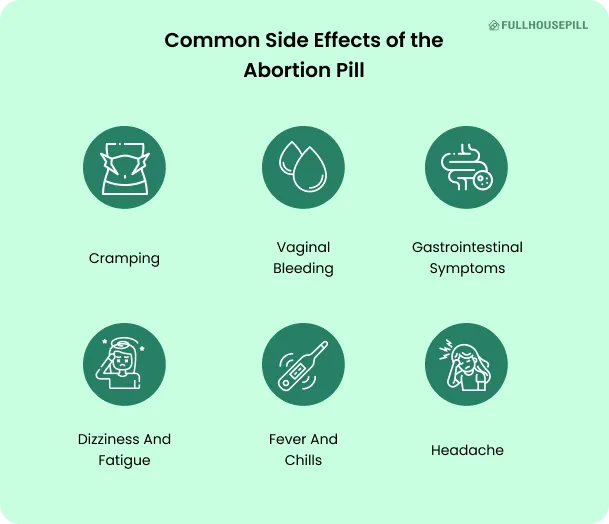
How long do you bleed after the abortion pill?
Vaginal bleeding usually begins after taking misoprostol. This bleeding is part of the body’s process of expelling the pregnancy. Most people experience bleeding heavier than a normal period. Blood clots and tissue may be visible. Bleeding typically lasts for 7 to 10 days. Light spotting can continue for up to two weeks. Some may experience irregular bleeding for a month. The exact duration varies based on individual response, gestational age, and dosage. Sanitary pads help monitor bleeding levels and reduce infection risk. Persistent heavy bleeding or prolonged pain may signal a complication. Healthcare providers recommend seeking medical help if bleeding soaks through two pads per hour for two hours straight.
How much does the abortion pill cost?
The cost of the abortion pill depends on the location, provider, and type of service. Clinics, telehealth providers, and pharmacies may charge different fees. The price typically ranges from £100 to £500 in the UK. Some government-funded programmes or charities may offer the abortion pill at a reduced cost or for free. Costs may also include consultation, follow-up care, or ultrasound scans. Online services may offer cheaper alternatives, but risks increase with unverified sources. Individuals should confirm medication authenticity and safety before purchasing from unofficial sellers.
Do’s and Don’ts after the abortion pill
- Do: Expect cramping and bleeding Cramping and bleeding are normal signs that the medication is working. Misoprostol causes uterine contractions, which help expel the pregnancy tissue. These symptoms usually start within a few hours and can last for several days.
- Do: Use sanitary pads instead of tampons Sanitary pads allow you to track the amount and type of bleeding. They also lower the risk of infection, especially while the cervix is slightly open during the process.
- Do: Rest and stay hydrated Your body needs time to recover. Drinking fluids and taking time off helps manage fatigue and supports the healing process.
- Do: Monitor for warning signs Keep an eye on symptoms like extremely heavy bleeding (soaking more than two pads per hour), intense abdominal pain, high fever, or foul-smelling discharge. These could signal an infection or incomplete abortion.
- Do: Attend follow-up appointments A follow-up ultrasound or consultation confirms that the abortion is complete. This step is crucial to rule out retained tissue or complications.
- Don’t: Take aspirin for pain relief Aspirin can thin the blood and increase bleeding. Safer alternatives like ibuprofen or paracetamol are usually recommended by healthcare providers.
- Don’t: Use tampons or menstrual cups Tampons and cups can introduce bacteria and increase the risk of infection. Wait until the bleeding has stopped before using internal products again.
- Don’t: Have sex until the bleeding stops Penetrative sex can raise the risk of infection while the cervix remains slightly open. Waiting until the bleeding fully stops lowers this risk.
- Don’t: Ignore severe symptoms Ignoring signs like severe pain or continuous heavy bleeding can delay treatment for complications like infection or incomplete abortion.
| Do | Don’t |
|---|---|
| Expect cramping and bleeding, it’s a sign it’s working | Take aspirin |
| Use sanitary pads to track bleeding safely | Use tampons or cups |
| Stay hydrated and rest for proper recovery | Have sex while bleeding |
| Monitor symptoms like pain, fever, and bleeding volume | Ignore serious symptoms |
| Attend follow-up for confirmation of completion | Skip medical advice or ultrasound checks |
How effective is the abortion pill?
The abortion pill is highly effective during the first 10 weeks of pregnancy. Mifepristone and misoprostol together offer a success rate of over 95% when used correctly. In one clinical study, this combination resulted in complete abortion in 70.7% of cases within 63 days of gestation. No ongoing pregnancies were recorded in that group. Another study found 97% success in self-managed medication abortion using both drugs. Misoprostol alone was also effective in 99% of those cases with accompaniment support. However, clinical outcomes vary depending on dosage, timing, and supervision. Efficacy declines with increasing gestational age. Unsupervised or incorrect use of abortion pills increases the risk of complications. A study showed that 66% of women who self-medicated had incomplete abortions. These findings emphasise the value of guided support and professional consultation during the abortion process.
Is the abortion pill safe?
The abortion pill is considered safe when used as directed. Legal, medically supervised abortion is one of the safest procedures in healthcare. A 2012 study found the risk of death from abortion is 14 times lower than that of childbirth. The CDC reported only 0.43 maternal deaths per 100,000 abortion procedures in the US. By contrast, childbirth carries a risk of 17.2 deaths per 100,000 live births. In the UK, medical bodies confirm that abortion is safer than carrying a pregnancy to term. The SAFE study found no serious complications during self-managed abortions using mifepristone and misoprostol up to 63 days gestation. However, the World Health Organization classifies abortions as unsafe if performed without medical training or supervision. Self-administered abortion without guidance can lead to serious health risks. These include sepsis, ectopic pregnancy, uterine perforation, and incomplete abortion. One study revealed that many women who self-used MTP pills faced severe complications. This included bleeding, retained pregnancy tissue, and misdiagnosed ectopic pregnancies. Proper education, access to licensed medications, and clinical follow-up reduce these risks significantly.

Written & Reviewed By
Dr. William Henderson , MD (Couples Therapy and Sexual Health Specialist)
